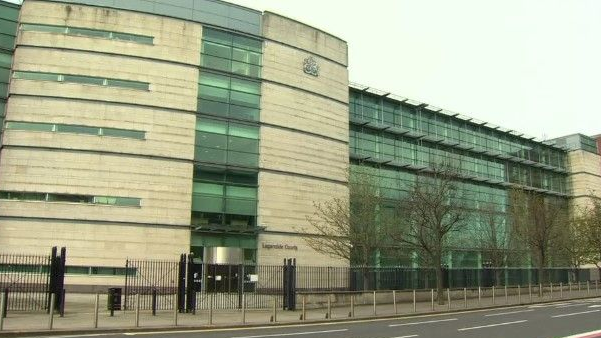Recordings are 'republican pub talk' says lawyer

Defence lawyers have launched legal application at Belfast Crown Court to have case against their clients dismissed
- Published
A lawyer for one of ten people facing terrorism charges linked to the New IRA has argued that secret recordings amounted to nothing more than “republican pub talk”.
The case arises from a major undercover surveillance operation by MI5 and police, called Operation Arbacia, into the activities of alleged violent dissident republicans.
Between them the ten defendants face multiple charges arising from alleged meetings in 2020 in two properties in County Tyrone and in Edinburgh.
Defence lawyers have begun a legal application at Belfast Crown Court to have the case against their clients dismissed.
The charges include directing a terrorist organisation, belonging to a proscribed organisation, preparing terrorist acts, conspiring to direct terrorism and possessing articles for use in terrorism.
The ten defendants:
Jospeh Patrick Barr, 36, Cecilias Walk, Prehen Park, Londonderry
Issam Bassalat, 66, Telford Road, Edinburgh
Amanda Duffy, 53, Aylesbury Gardens, Lurgan
Gary Jospeh Hayden, 52, Tyrconnell Street, Londonderry
David Jordan, 52, Castlecaulfield Road, Dungannon
Sharon Jordan, 49, Cappagh Road, Dungannon
Patrick John McDaid, 54, HMP Maghaberry
Damien Joseph McLaughlin, 47, Kilmascally Road, Dungannon
Kevin Barry Murphy, 53, Altowen Park, Coalisland
Shea Reynolds, 30, Belvedere Manor, Lurgan
'Pie in the sky waffle'
Defence barrister Joe Brolly, representing Patrick McDaid, said the recordings were “republican pub talk” and “pie in the sky waffle”.
Mr Brolly claimed "no plans were hatched, no plans of terrorism were prepared."
David Jordan’s barrister, Des Fahy KC, argued that evidence had been replaced by mere suspicion.
He said while his client’s outlook and political leanings may be clear, there had been a “leap into the evidential dark” to bridge the gap between his beliefs and putting him on trial for the serious matters that are alleged.
He added that the charge of membership of a proscribed organisation required proof, not merely being a sympathiser.
Amanda Duffy’s lawyer Joseph O'Keefe questioned the reliability of evidence which attributed what was said on the recordings.
He said speech evidence from the same expert witness had been ruled inadmissible in two other terrorism trials.
Location of recordings not disclosed
He also said the exact location of the devices deployed to record the meeting had not been disclosed.
Security service witnesses told a previous court hearing that the devices were “covering a property” but cited national security when asked to provide a specific location.
A Saoradh strategy document which formed the basis of a charge of possession of an article for use in terrorism, was described as a lawful political document.
Mr O’Keefe said “the content may well be unpopular to vast swathes of our society” but nonetheless it was protected by freedom of expression laws.
Dr Issam Bassalat is charged with preparation of terrorist acts, and addressing a meeting for the purpose to encourage support for a proscribed organisation.
Brenda Campbell KC said her client was a seasoned campaigner on behalf of the Palestinian people and there was nothing to suggest that he was somebody who was committed to terrorism.
Describing him as a man of good character and an NHS doctor, Ms Campbell said he was invited to attend the second meeting "by a person who it would appear is an agent of the state."
She said his only purpose at being at the meeting was to raise the plight of the Palestinian people and he had done nothing to transgress the law or face the charges he faces.
Barristers for the other defendants also argued that there wasn't enough evidence to substantiate the charges against their clients.
The hearing before Mr Justice Fowler is due to resume on Wednesday when a final defence lawyer will set out his arguments and the prosecution will have an opportunity to respond.
The judge will then decide if the case will proceed to trial.